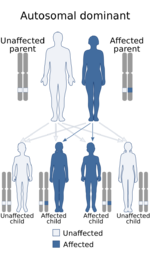Medicine:Autosomal dominant hypophosphatemic rickets
| X-linked dominant hypophosphatemic rickets | |
|---|---|
 | |
| This condition is inherited in an autosomal dominant manner |
Autosomal dominant hypophosphatemic rickets (ADHR) is a rare hereditary disease in which excessive loss of phosphate in the urine leads to poorly formed bones (rickets), bone pain, and tooth abscesses. ADHR is caused by a mutation in the fibroblast growth factor 23 (FGF23). ADHR affects men and women equally; symptoms may become apparent at any point from childhood through early adulthood. Blood tests reveal low levels of phosphate (hypophosphatemia) and inappropriately normal levels of vitamin D.[citation needed] Occasionally, hypophosphatemia may improve over time as urine losses of phosphate partially correct.[citation needed]
ADHR may be lumped in with X-linked hypophosphatemia under general terms such as hypophosphatemic rickets. Hypophosphatemic rickets are associated with at least nine other genetic mutations.[1] Clinical management of hypophosphatemic rickets may differ depending on the specific mutations associated with an individual case, but treatments are aimed at raising phosphate levels to promote normal bone formation.[2] In a 2019 randomised, clinical trial the rickets in children with X-linked hypophosphataemia treated with a human monoclonal antibody against FGF23 called burosumab improved significantly compared to conventional therapy.[3]
References
- ↑ Online Mendelian Inheritance in Man (OMIM) 193100
- ↑ "Hypophosphatemic rickets". Genetic and Rare Diseases Information Center. National Institutes of Health. http://rarediseases.info.nih.gov/GARD/Disease.aspx?PageID=4&DiseaseID=6735.
- ↑ "Burosumab versus conventional therapy in children with X-linked hypophosphataemia: a randomised, active-controlled, open-label, phase 3 trial" (in English). Lancet 393 (10189): 2416–2427. June 2019. doi:10.1016/S0140-6736(19)30654-3. PMID 31104833.
Further reading
- "Hereditary hypophosphatemic rickets". Genetics Home Reference. September 2010. http://ghr.nlm.nih.gov/condition/hereditary-hypophosphatemic-rickets/show/MedlinePlus.
- "Hypophosphatemic Rickets". The Merck Manual Home Health Handbook. Merck Sharp & Dohme Corp. December 2006. http://www.merckmanuals.com/home/kidney_and_urinary_tract_disorders/tubular_and_cystic_kidney_disorders/hypophosphatemic_rickets.html.
External links
| Classification | |
|---|---|
| External resources |
 |

